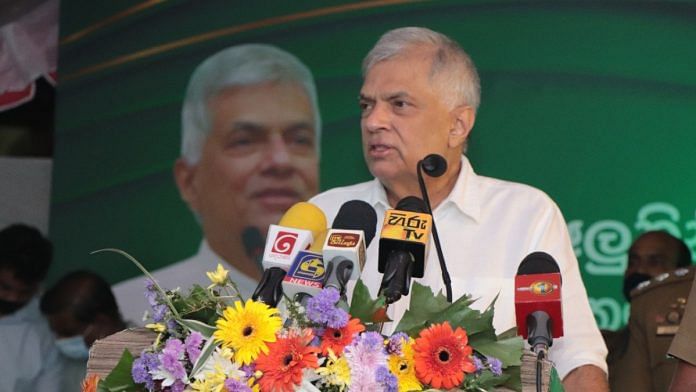New Delhi: With Ranil Wickremesinghe taking over as the president of Sri Lanka Thursday, questions are being raised about what the next phase of Colombo’s negotiations with the International Monetary Fund (IMF) will look like.
On Wednesday, IMF Managing Director Kristalina Georgieva had said the global body hopes to complete the negotiations with Sri Lanka “as quickly as possible“.
In the past, the island nation has held several rounds of discussions with the IMF but the scenario is now different given its bankruptcy. Sri Lanka is looking to secure a $3 billion bailout package from the global financial body to tide over an economic crisis triggered by the drying up of foreign reserves.
The Wickremesinghe administration plans to submit a report on debt restructuring to the IMF by August. Experts from top financial and legal firms, Lazard and Clifford Chance — headquartered in the US and UK, respectively — were flown in recently to help prepare the report.
More importantly, the government will have to provide assurances that debt sustainability will be restored. In simple terms, this is meant to show that Sri Lanka can balance its needs for funds with the ability to repay its debts.
What could also play a factor in the IMF negotiations is the stability and public support behind Wickremesinghe’s administration. Georgieva had told Nikkei Asia that the IMF is open to working with any Sri Lankan government “as long as the next leader enjoys support and has the longevity to lead the country.”
However, Wickremesinghe appears to be deeply unpopular. More so, he is currently only filling in for Gotabaya Rajapaksa’s term that ends in 2024. ThePrint reported Wednesday that protesters chanted “Go, Ranil, go” in Colombo as Wickremesinghe was being elected. Wickremesinghe’s closeness to the Rajapaksas had also prompted protesters to storm his office and demand his resignation as PM.
The new president sought to distance himself from the previous regime. “I am not a friend of the Rajapaksas, I am a friend of the people,” he said Thursday.
Also Read: ‘Close friend’ India vows support to new Lanka President Wickremesinghe, denies ‘interference’
What will an IMF package entail
An IMF package will not only include funds but also economic reforms which are expected to address corruption, enable a return to an open economy and may include far-reaching tax reforms given the low level of revenues.
The Sri Lankan opposition has also called for the reform of state-owned enterprises (SOEs).
The reforms will be supported by a lending facility of the IMF known as the Extended Fund Facility (EFF) arrangement.
In the immediate term, Sri Lanka is preparing to submit a report on debt restructuring to the IMF by August. A plan on debt sustainability will be submitted separately. The second report is critical because any loan assistance programme requires adequate assurances on debt sustainability for the IMF Board’s approval.
The IMF has termed Sri Lanka a “warning sign” for other countries. “Countries with high debt levels and limited policy space will face additional strains. Look no further than Sri Lanka as a warning sign,” Georgieva had said on 16 July.
After submitting these preliminary reports, Sri Lanka needs to come to a staff-level agreement with the IMF i.e. an agreement with the IMF’s technical team stationed in the country. The staff-level agreement must then be presented to the IMF Board of Directors for approval. Post approval, a comprehensive loan-assistance programme will be prepared for a four-year period.
But the immediate bailout package is only one part of Colombo’s economic troubles. During a parliamentary speech on 5 July, Wickremesinghe explained: “I would like to give you an idea of the debt we have to pay off so far — $3.4 billion between June and December this year, $5.8 billion in 2023, $4.9 billion in 2024, $6.2 billion in 2025, $4 billion in 2026, $4.3 billion in 2027.”
Also Read: ‘Why politicise?’ Oppn MPs object as govt flags states’ ‘poor fiscal health’ at Lanka meeting



